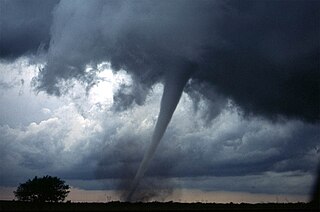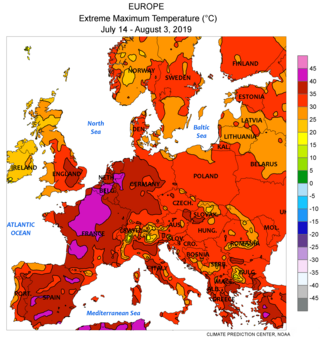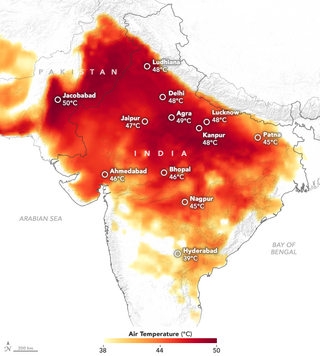
Extreme weather includes unexpected, unusual, severe, or unseasonal weather; weather at the extremes of the historical distribution—the range that has been seen in the past. Extreme events are based on a location's recorded weather history. They are defined as lying in the most unusual ten percent. The main types of extreme weather include heat waves, cold waves and heavy precipitation or storm events, such as tropical cyclones. The effects of extreme weather events are economic costs, loss of human lives, droughts, floods, landslides. Severe weather is a particular type of extreme weather which poses risks to life and property.

Climatology or climate science is the scientific study of Earth's climate, typically defined as weather conditions averaged over a period of at least 30 years. Climate concerns the atmospheric condition during an extended to indefinite period of time; weather is the condition of the atmosphere during a relative brief period of time. The main topics of research are the study of climate variability, mechanisms of climate changes and modern climate change. This topic of study is regarded as part of the atmospheric sciences and a subdivision of physical geography, which is one of the Earth sciences. Climatology includes some aspects of oceanography and biogeochemistry.

A heat wave, sometimes known as extreme heat, is a period of abnormally hot weather. High humidity often accompanies heat waves. This is especially the case in oceanic climate countries. Definitions vary but are similar. We usually measure a heat wave relative to the usual climate in the area and to normal temperatures for the season. Temperatures that people from a hotter climate consider normal can be called a heat wave in a cooler area. This would be the case if the warm temperatures are outside the normal climate pattern for that area. Heat waves have become more frequent, and more intense over land, almost everywhere since the 1950s. This is due to climate change.
This glossary of climate change is a list of definitions of terms and concepts relevant to climate change, global warming, and related topics.

Climate change affects the physical environment, ecosystems and human societies. Changes in the climate system include an overall warming trend, more extreme weather and rising sea levels. These in turn impact nature and wildlife, as well as human settlements and societies. The effects of human-caused climate change are broad and far-reaching. This is especially so if there is no significant climate action. Experts sometimes describe the projected and observed negative impacts of climate change as the climate crisis.

Are We Changing Planet Earth? and Can We Save Planet Earth? are two programmes that form a documentary about global warming, presented by David Attenborough. They were first broadcast in the United Kingdom on 24 May and 1 June 2006 respectively.

Polar amplification is the phenomenon that any change in the net radiation balance tends to produce a larger change in temperature near the poles than in the planetary average. This is commonly referred to as the ratio of polar warming to tropical warming. On a planet with an atmosphere that can restrict emission of longwave radiation to space, surface temperatures will be warmer than a simple planetary equilibrium temperature calculation would predict. Where the atmosphere or an extensive ocean is able to transport heat polewards, the poles will be warmer and equatorial regions cooler than their local net radiation balances would predict. The poles will experience the most cooling when the global-mean temperature is lower relative to a reference climate; alternatively, the poles will experience the greatest warming when the global-mean temperature is higher.

Six Degrees: Our Future on a Hotter Planet, ISBN 978-0-00-720905-7 is a 2007 non-fiction book by author Mark Lynas about global warming. The book looks and attempts to summarize results from scientific papers on climate change.
Climate change is an urgent and significant issue affecting Japan. In recent years, the country has observed notable changes in its climate patterns, with rising temperatures serving as a prominent indicator of this phenomenon. As an archipelago situated in northeastern Asia, Japan is particularly vulnerable to the impacts of climate change due to its diverse geography and exposure to various weather systems. The nation experiences a broad range of climates, spanning from the frigid winters of Hokkaido to the subtropical climates of Okinawa. Changes in temperature patterns have the potential to disrupt ecosystems, impact agricultural productivity, modify water resources, and pose significant challenges to infrastructure and human settlements.

Climate change in California has resulted in higher than average temperatures, leading to increased occurrences of drought and wildfires. During the next few decades in California, climate change is likely to further reduce water availability, increase wildfire risk, decrease agricultural productivity, and threaten coastal ecosystems. The state will also be impacted economically due to the rising cost of providing water to its residents along with revenue and job loss in the agricultural sector. California has taken a number of steps to mitigate impacts of climate change in the state.
More than 1,030 people were killed in the 2002 heatwave in South India. Most of the dead were poor and elderly and a majority of deaths occurred in the southern state of Andhra Pradesh. In the districts that were impacted most, the heat was so severe that ponds and rivers evaporated and in those same districts birds had fallen from the sky and animals were collapsing from the intense heat.

Climate change and poverty are deeply intertwined because climate change disproportionally affects poor people in low-income communities and developing countries around the world. The impoverished have a higher chance of experiencing the ill-effects of climate change due to the increased exposure and vulnerability. Vulnerability represents the degree to which a system is susceptible to, or unable to cope with, adverse effects of climate change including climate variability and extremes.
Human rights and climate change is a conceptual and legal framework under which international human rights and their relationship to global warming are studied, analyzed, and addressed. The framework has been employed by governments, United Nations organizations, intergovernmental and non-governmental organizations, human rights and environmental advocates, and academics to guide national and international policy on climate change under the United Nations Framework Convention on Climate Change (UNFCCC) and the core international human rights instruments. In 2022 Working Group II of the IPCC suggested that "climate justice comprises justice that links development and human rights to achieve a rights-based approach to addressing climate change".

The effects of climate change on human health are increasingly well studied and quantified. Rising temperatures and changes in weather patterns are increasing the frequency and severity of heat waves, wildfires, droughts, floods, landslides, hurricanes, and other causes of injury and illness. Heat waves and extreme weather events have a big impact on health both directly and indirectly. Direct effects of exposure to high and extended temperatures include illness, reduced labour capacity for outdoor workers, and heat-related mortality.
The 2016 Indian heat wave was a major heat wave in April and May of that year. A national record high temperature of 51.0 °C (123.8 °F) was set in the town of Phalodi, in the state of Rajasthan. Over 160 people died with 330 million affected to some degree. There were also water shortages with drought worsening the impact of the heat wave.

In France, climate change has caused some the greatest annual temperature increases registered in any country in Europe. The 2019 heat wave saw record temperatures of 46.0 °C. Heat waves and other extreme weather events are expected to increase with continued climate change. Other expected environmental impacts include increased floods due to both sea level rise and increased glacier melt. These environmental changes will lead to shifts in ecosystems and affect local organisms. Climate change will also cause economic losses in France, particularly in the agriculture and fisheries sectors.
In 2018, several heat waves with temperatures far above the long-time average and droughts were recorded in the Northern Hemisphere: The earth's average surface temperature in 2018 was the fourth highest in the 140 years of record keeping. It is assumed that the jet stream is slowing down, trapping cloudless, windless and extremely hot regions of high pressure. The jet stream anomalies could be caused by polar amplification, one of the observed effects of global warming.

From mid-May to mid-June 2019, the republics of India and Pakistan had a severe heat wave. It was one of the hottest and longest heat waves in the subcontinent since the two countries began recording weather reports. The highest temperatures occurred in Churu, Rajasthan, reaching up to 50.8 °C (123.4 °F), a near record high in India, missing the record of 51.0 °C (123.8 °F) set in 2016 by a fraction of a degree. As of 12 June 2019, 32 days are classified as parts of the heatwave, making it the second longest ever recorded.

The 2021 Western North America heat wave was an extreme heat wave that affected much of Western North America from late June through mid-July 2021. Extreme event attribution found this was a 1000-year weather event, made 150 times more likely by climate change. A study in Nature Climate Change estimated that its occurrence, while previously thought virtually impossible, is projected to increase rapidly with further global warming, possibly becoming a 10-yearly occurrence in a climate 2°C warming than the pre-industrial period, which may be reached by 2050 if fossil fuels are not phased out and carbon-dioxide emissions eliminated. The heat wave affected Northern California, Idaho, Western Nevada, Oregon, and Washington in the United States, as well as British Columbia, and in its latter phase, Alberta, Manitoba, the Northwest Territories, Saskatchewan, and Yukon, all in Canada. It also affected inland regions of Central and Southern California, Northwestern and Southern Nevada and parts of Montana, though the temperature anomalies were not as extreme as in the regions farther north.

In 2022, several areas of the world experienced heat waves. Heat waves were especially notable in East Asia, the Indian subcontinent, Australia, western Europe, the United States, and southern South America. 2022 heat waves accounted for record-breaking temperatures and, in some regions, heat-related deaths. Heat waves were worsened by the effects of climate change, and they exacerbated droughts and wildfires.














